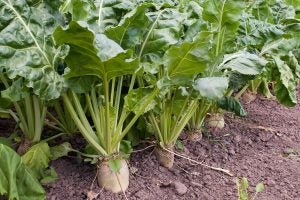Suzette L. is a woman who has been following me on social media for quite sometime and has been complimentary of my agricultural advocacy work. Not long ago, she responded to one of my Instagram videos about Roundup with this direct message:
“Preach it girl! My husband was a crop duster pilot who worked on both traditional and organic crops. I recently lost him to an airplane crash where he was sulfur dusting organic tomatoes. So the organic dust destroyed and killed his lungs. Wish he would of been spraying roundup instead! He would still be alive.”
Wow! What a message. And of course, our heart goes it to her for her loss.
Many people believe that organic crops are not sprayed with pesticides, but this is an oft-repeated myth, particularly common among those who have a stake in organic products. There are a lot of popular disinformation campaigns out there, designed to stir fear and doubt in the consumers mind and sell them something more expensive or with a certain label.
Sulfur dust is used on many crops. It kills mites, it changes pH in soil and protects against powdery mildew. Suzette’s late husband would put it out on grapes, tomatoes and sugar beets.

Sulfur dust can be highly explosive, like the head of a match. According to his widow and Sacramento County, California, news reports, he was putting it out on tomatoes in August when his airplane engine quit. He crashed, and the plane caught fire. He was wearing a Nomex flight suit, Nomex gloves, a respirator and helmet when he flew and put out dust. He was able to crawl out of the airplane, but when the flames and sulfur powder engulfed him he took off the respirator (I’m suspect the flames started to melt the respirator as well). The pilot inhaled the dust and flames, which severely damaged his lungs.
He survived three weeks in a burn unit, but ultimately his lungs were too damaged from the dust and fire. The hospital also did not remove the dust off of him immediately, according to his widow, so it’s believed that the dust sat on his skin, irritating the burns and making them worse.
Sulfur dust is very irritating. It would often burn his eyes and nose when he would dispense it, despite wearing all the protective gear.
The moral of the story is that anything can be toxic at high doses. It’s not a matter of organic vs. traditional, it’s about toxicity levels. We all need water, salt and sugar to survive, but too much can also kill us.
Our industry lives for going to air shows, events, grocery stores and more to educate people on what we do, and we need more advocacy efforts. So many think organic means never sprayed — or not sprayed with anything that can have ill effects on human health — but this is simply not true. Just because a pesticide product is natural doesn’t mean it is less toxic than its synthetic counterpart. The dose, frequency of application, and mode of action all contribute to toxicity, and the severity is determined by the U.S. Environmental Protection Agency.
Our food here in the U.S. really is one of the safest due to regulatory oversight.
Michelle Miller, the “Farm Babe,” is an internationally recognized keynote speaker, writer, and social media influencer and travels full time to advocate for agriculture. She comes from an Iowa-based row crop and livestock farming background and now resides on a timber farm in North Central Florida.



